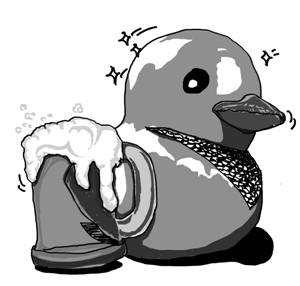Copycat culture must stop

Illustration: Lu Ting/GT
"The Rubber Duck knows no frontiers," the award-winning Dutch artist Florentijn Hofman so describes his giant yellow duckie, a popular art installation that he designed in 2007 and has since toured many cities around the world. The duck's official website says "it doesn't discriminate people and doesn't have a political connotation."
However, what Hofman didn't know is that Chinese copycats also know no bounds. The inflatable duck has now left Hong Kong's Victoria Harbor and is migrating across the Pacific to the US. But numerous fake copies of the duck have popped up on the Chinese mainland with no signs of leaving. In the past month, inflatable yellow ducks of various sizes, with slight changes in appearance to Hofman's original, have been spotted in cities, including Dongguan, Guangzhou, Nanjing and Xi'an, bobbing up and down in lakes or installed outside shopping malls to attract customers.
The duck craze finally spread to Shanghai recently, when an inflatable yellow duck, albeit much smaller than the 16.5-meter-tall Hong Kong incarnation, appeared outside a bar on Fumin Road in Jing'an district. According to the official Sina Weibo account of the bar, they were holding a rubber duck-themed party. To promote the event, the owner of the bar even loaded the duck on a truck and drove it around the city, hoping to attract attention. But the truck was stopped by a traffic policeman, who said the 3-meter-tall duck was too big and might pose a threat to road safety.
The national frenzy over the duck is a reminder of China's deeply rooted copycat culture, but we spectators also have a role to play in our country's lack of originality.
I would suggest that every consumer in China boycott imitated, or shanzhai, products out of respect for original ideas.
Unlike in Western countries, where the act of copying is considered to indicate a shameful lack of imagination, copying isn't stigmatized in China. This is why even though everyone knows these ducks are fake, many people still welcome the avian imposters and think they are cute. This overly tolerant attitude towards the culture of copying has only made it even more brazen in China, and imitating someone else's success has essentially become the easiest way to succeed oneself.
Ultimately, Chinese people will have to pay a price for their tolerance for fakes.
With Chinese imitations of the giant duck making international headlines, artists might think twice about bringing their original works to China out of fear that they will be copied, rather than respected, here.
This has already happened in the commercial sector. Many famous brands are reportedly reluctant to enter China, afraid that their products will be pirated. Earlier this year, Vera Wang, the well-known wedding dress designer, opened a store in Shanghai and charged Chinese brides-to-be a 3,000 yuan ($489.71) try-on fee in an effort to fend off China's rampant copiers. The store later scrapped the fee after local media reported the unequal treatment, but it's not hard to sympathize with Wang's initial concerns.